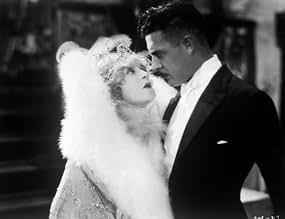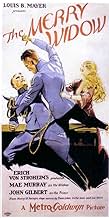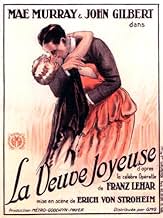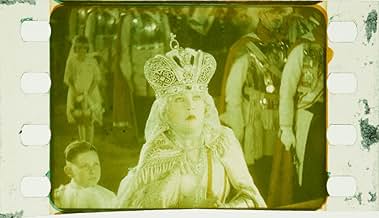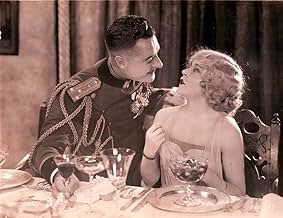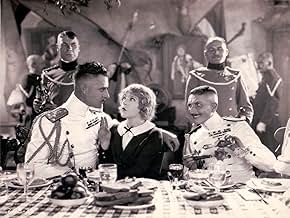AVALIAÇÃO DA IMDb
7,2/10
2,6 mil
SUA AVALIAÇÃO
Adicionar um enredo no seu idiomaA prince must woo the now-wealthy dancer he once abandoned, to keep her money in the country in order to keep it from crashing economically.A prince must woo the now-wealthy dancer he once abandoned, to keep her money in the country in order to keep it from crashing economically.A prince must woo the now-wealthy dancer he once abandoned, to keep her money in the country in order to keep it from crashing economically.
- Prêmios
- 3 vitórias no total
Gertrude Bennett
- Hard-Boiled Virginia
- (não creditado)
Bernard Berger
- Boy
- (não creditado)
Sidney Bracey
- Danilo's Footman
- (não creditado)
Estelle Clark
- French Barber
- (não creditado)
Albert Conti
- Danilo's Adjutant
- (não creditado)
D'Arcy Corrigan
- Horatio
- (não creditado)
Joan Crawford
- Ballroom Dancer
- (não creditado)
Xavier Cugat
- Orchestra Leader
- (não creditado)
Anielka Elter
- Blindfolded Musician
- (não creditado)
Dale Fuller
- Sadoja's Chambermaid
- (não creditado)
Clark Gable
- Ballroom Dancer
- (não creditado)
Enredo
Você sabia?
- CuriosidadesWhile filming the climactic ballroom scene, Erich von Stroheim noticed an extra whose costume was not adjusted to his liking. He stepped off the high camera platform on which he was standing, fell, and broke his leg. He directed the rest of the film from a reclining chair while his leg healed.
- Erros de gravaçãoA title card reads "a prince has a duty to his country higher then [sic] his duty to himself" - a grammatical error unusual for such a prestigious studio as MGM.
- Citações
Prince Danilo Petrovich: Where the devil did you get these pictures?
Danilo's Adjutant: From my barber--he said he got them in Paris.
- Cenas durante ou pós-créditosThe credits state that the film is "personally directed by" Erich von Stroheim.
- Versões alternativasThe version shown on the Turner Classic Movies (TCM) channel has the musical score arranged by Dennis James and performed by him on a Möller pipe organ. It is shown at a proper silent movie speed and runs 137 minutes.
- ConexõesEdited into Histoire(s) du cinéma: Seul le cinéma (1994)
Avaliação em destaque
A romantic Prince from tiny Monteblanco attempts to woo THE MERRY WIDOW who once loved him when she was a poor dancer.
Erich von Stroheim, the Teutonic genius who marched through Hollywood's Silent Days like a conquering general, had his final directorial stint at MGM Studios producing this lavish & brilliant film based on the operetta by Franz Lehár. The visuals are striking, with sets that look like actual locations--a mountaintop village; the Castellano Cathedral; Maxim's in Paris--and the occasional bizarre touch--the blindfolded musicians sharing the Prince's seduction bed, for example--which von Stroheim relished. The acting is flawless, with no need for dialogue. The actors' faces speak all that need be said.
Mae Murray & John Gilbert portray the passionate lovers whom Fate (and the plot) contrives to keep apart so successfully. Miss Murray (she and the director loathed each other) powerfully portrays a street-wise performer who, through a series of heartbreaks, becomes a vastly wealthy woman. Gilbert expertly plays a prince whose charm has always gotten him his way. Their scenes together, most particularly the waltz sequences, fairly blaze with unrequited sensual longing and desire.
While it is entertaining to wonder what von Stroheim would have done with the role, it is difficult to imagine anyone better than Roy D'Arcy as the simpering, lusting, sneering Crown Prince; he is pure villainy personified and his eventual fate is absolutely justified. Josephine Crowell gives a fine performance as the Queen. Tully Marshall, one of von Stroheim's favorite character actors, adds another portrait to his gallery of grotesques, this time playing a crippled baron with a foot fetish.
The wonderful organ score which accompanies the film was arranged & performed by Dennis James.
MGM would tackle THE MERRY WIDOW again nine years later and produce a vastly different film, this time directed by Ernst Lubitsch and starring Maurice Chevalier & Jeanette MacDonald.
Erich von Stroheim, the Teutonic genius who marched through Hollywood's Silent Days like a conquering general, had his final directorial stint at MGM Studios producing this lavish & brilliant film based on the operetta by Franz Lehár. The visuals are striking, with sets that look like actual locations--a mountaintop village; the Castellano Cathedral; Maxim's in Paris--and the occasional bizarre touch--the blindfolded musicians sharing the Prince's seduction bed, for example--which von Stroheim relished. The acting is flawless, with no need for dialogue. The actors' faces speak all that need be said.
Mae Murray & John Gilbert portray the passionate lovers whom Fate (and the plot) contrives to keep apart so successfully. Miss Murray (she and the director loathed each other) powerfully portrays a street-wise performer who, through a series of heartbreaks, becomes a vastly wealthy woman. Gilbert expertly plays a prince whose charm has always gotten him his way. Their scenes together, most particularly the waltz sequences, fairly blaze with unrequited sensual longing and desire.
While it is entertaining to wonder what von Stroheim would have done with the role, it is difficult to imagine anyone better than Roy D'Arcy as the simpering, lusting, sneering Crown Prince; he is pure villainy personified and his eventual fate is absolutely justified. Josephine Crowell gives a fine performance as the Queen. Tully Marshall, one of von Stroheim's favorite character actors, adds another portrait to his gallery of grotesques, this time playing a crippled baron with a foot fetish.
The wonderful organ score which accompanies the film was arranged & performed by Dennis James.
MGM would tackle THE MERRY WIDOW again nine years later and produce a vastly different film, this time directed by Ernst Lubitsch and starring Maurice Chevalier & Jeanette MacDonald.
- Ron Oliver
- 9 de out. de 2004
- Link permanente
Principais escolhas
Faça login para avaliar e ver a lista de recomendações personalizadas
- How long is The Merry Widow?Fornecido pela Alexa
Detalhes
- Data de lançamento
- País de origem
- Idioma
- Também conhecido como
- The Merry Widow
- Locações de filme
- Empresas de produção
- Consulte mais créditos da empresa na IMDbPro
Bilheteria
- Orçamento
- US$ 592.000 (estimativa)
- Tempo de duração2 horas 17 minutos
- Cor
- Mixagem de som
- Proporção
- 1.33 : 1
Contribua para esta página
Sugerir uma alteração ou adicionar conteúdo ausente

Principal brecha
By what name was A Viúva Alegre (1925) officially released in India in English?
Responda
